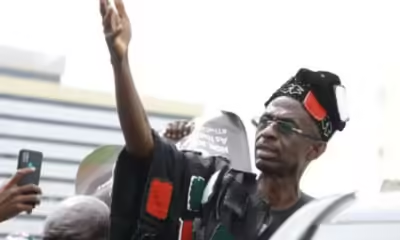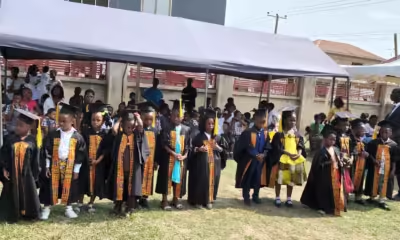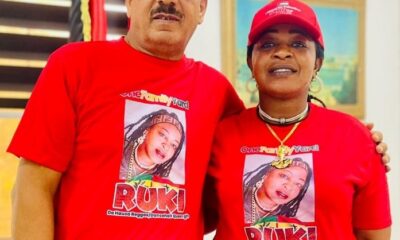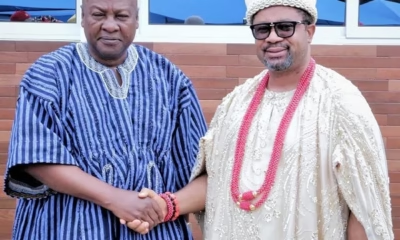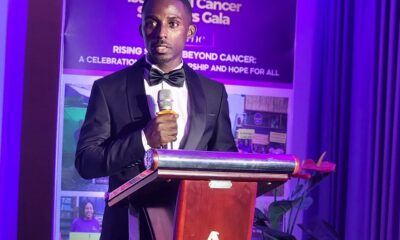News
Clergy urged to use Easter to promote cleanliness, sanitation
Published
3 days agoon
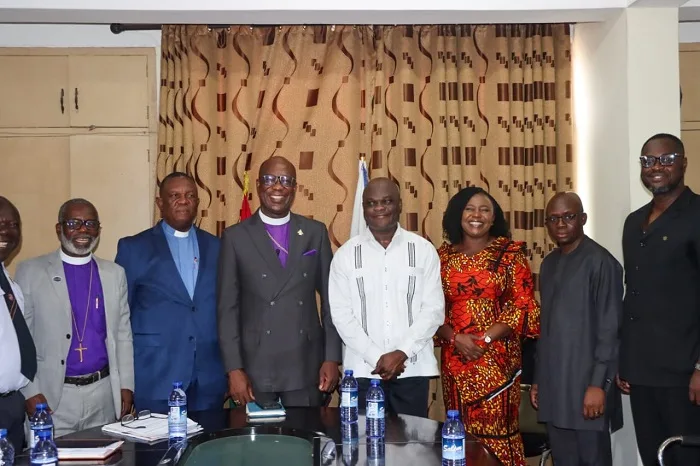
Christian religious leaders have been urged to utilise their influence during the Easter period to promote the culture of cleanliness and sanitation across the country.
This is because religious leaders can influence their followers to change their behaviour and mindset, particularly on the environment and sanitation.
The Minister of Local Government, Chieftaincy and Religious Affairs, Mr Ahmed Ibrahim, made the call yesterday in Accra, when he and his entourage visited some Christian religious institutions, including the Christian Council of Ghana (CCG), Presbyterian Church of Ghana, Headquarters, and the Seventh Day Adventist Church, in the Greater Accra region.
The engagements form part of broader consultations being held with faith-based organisations to galvanise national support and community participation for the promotion of culture of cleanliness and sanitation.
Mr Ibrahim lamented the rapid rate at which plastic waste was being littered in the country, leading to the reduction or loss of soil fertility and the pollution of the environment.
He noted that managing sanitation and hygiene required collaborative effort among relevant stakeholders.
Chairman of the CCG, Rev. Dr Hilliard Dela Dogbe, indicated that his outfit supported the government’s initiative to re-launch the National Sanitation Day, scheduled for May 3, 2025.
He assured that “We as the church wish to assure you of our support to make this vision a reality.”
Rev. Dr Dogbe also added that the Council acknowledged itself as a partner in development and appreciated the minister’s recognition of religious organisations and traditional leaders as vital stakeholders in national development.
Such a partnership, he said, “would foster a better Ghana when all parties recognise their roles and work together.”
Again, Rev. Dr Dogbe said that churches had been promoting ethical leadership and environmental stewardship through its programmes such as Leadership Conference.
He emphasised that taking proper care of the environment was both a national duty and a Christian obligation.
However, Rev. Dr Dogbe noted that a day’s clean-up exercises may not be sufficient and proposed a continuous process for the collection and disposal of waste.
He assured that the Council would ensure that its members embraced the initiative wholeheartedly.
Moreover, Rev. Dr Dogbe suggested the incorporation of civic education in the country’s educational system, starting from childhood in order to enable the citizenry develop a sense of discipline, especially on waste management and environmental conservation.
Mr Ibrahim was accompanied by the Deputy Minister of Local Government, Chieftaincy and Religious Affairs, Ms Rita Naa Odorley Sowah, Chief Director of the Ministry, Alhaji Amin Abdul-Rahman, and other members of the ministry.
You may like


A touch of smock to style up on Easter


Churches tasked to tackle indiscipline in society


University of Ghana (UG) Engages Ministry of Communication, Digital Technology and Innovations on Strategic Collaboration


President Mahama launches ONE Million Coders programme


GFA Talent Identification Programme a huge success in Central Region, Western region next


Black Starlets kick off talent hunt in Greater Accra on Tuesday, April 22

Gone were the days when smock was worn only on occasions.
There was this perception that it can only be worn during engagements, weddings and festivals.
Interestingly, the Chief Executive Officer (CEO) of Avonsige has added new touches to the smock, making it a choice for all occasions.
With the new designs, the smock comes in forms of dresses, trousers, bubu dresses and skirts.





By Linda Abrefi Wadie

The Right Reverend Kwaku Effah, the Methodist Bishop of the Sunyani Diocese, has urged churches to help tackle the growing trend of indiscipline in the country.
That could be done if churches concentrate on building the youth to become matured in Christianity, he stated in an interview on the side-lines of the 46th annual synod of the Methodist of Ghana held at Duayaw-Nkwanta in the Ahafo Region.
It was under the theme: ‘Discipleship: growing into Christian maturity,’ and attended by Diocesan executives, the standing committees of the church, members of the coordination offices and pastors wives.
The synod enabled the church to take stock and highlighted the previous year’s achievements, looked into emerging challenges and projected for the future.
Rt Rev. Effah also noted that Christian maturity and a strengthened faith in God would make the youth disciplined and principled, and urged the churches to form youth groups and provide employable skills training to create job opportunities for them.
“The youth groups will bring young people together, provide them with employable skills training to build on their future,” he stated, asking Christians not to live to please themselves, instead strive to live to please God.
That would enable them to grow into Christian maturity and entreated the churches to also prioritise the spiritual growth and development of their members, saying the lives of Christians must develop physically, spiritually, emotionally and socially.
“Christian maturity is not about age or positions in the church, but a life characterised by holiness and righteousness,” he stated and urged Christians to pray constantly to strengthen their relationships with God.
They must also always seek the Holy Spirit guidance and look onto Jesus Christ and eschew sin and to live righteously. —GNA

The President of the Republic of Ghana, John Dramani Mahama has launched the One Million Coders programme, aimed at training one million Ghanaians with digital skills.
This programme seeks to empower young ghanaians, with coding skills and prepare them for the future job market.
The One Million Coders programme is under the Ministry of Communication, Digital Technology and Innovations aimed at promoting digital innovation and skills development in Ghana.
This programme aligns with the Ministry’s mandate to drive the country’s digital transformation agenda.
At the launch of the One Million Coders program, President John Mahama emphasized that this initiative is a strategic pillar in his efforts to reset Ghana’s agenda with digital skills.
It’s a deliberate attempt to invest in the future of Ghanaian youth through technology and innovation.
By equipping young people with cutting-edge digital skills, the country is empowering them to drive Ghana’s digital transformation and economic growth.
The President emphasized that the One Million Coders (OMC) programme encompasses more than just technical skills.
The President highlights the program’s potential to transform lives and drive economic growth. This perspective underscores the importance of digital literacy in today’s economy, where technological proficiency is increasingly crucial for success.
Hon. LlSamuel Nartey George (MP), Minister for Communication, Digital Technology and Innovations emphasized that the One Million Coders program is a flagship program of the John Mahama-led administration.
According to him, the program aims to equip young people with essential digital skills, demonstrating the government’s commitment to empowering the youth and bridging the digital divide.
The Minister was of the view that the initiative will create opportunities for individuals from disadvantaged backgrounds, promoting digital inclusion and reducing inequality, adding, the launch of the One Million Coders programme within the 120-day social contract period showcases President Mahama’s focus on delivering on his promises National Communications Authority

A touch of smock to style up on Easter

Churches tasked to tackle indiscipline in society

University of Ghana (UG) Engages Ministry of Communication, Digital Technology and Innovations on Strategic Collaboration
Trending

 Politics7 months ago
Politics7 months agoVoter Register Discrepancies: NDC to stage nationwide protests against EC

 News8 months ago
News8 months agoArise Royals Montessori School Marks 2nd Graduation.

 Entertainment9 months ago
Entertainment9 months agoGhanaian musician Champions Gaza Peace with New Track

 News4 months ago
News4 months agoKing of Igbo Community in Ghana congratulates Mahama as President-elect of Ghana.

 More8 months ago
More8 months agoYoung people urged to develop their talents

 Entertainment10 months ago
Entertainment10 months agoSteps to receive an official GWR certificate – Details from mother of a Ghanaian record holder

 News10 months ago
News10 months agoCancer Support Network Foundation holds gala

 Tech9 months ago
Tech9 months agoWatch out for sharks: The bizarre history of internet outages













